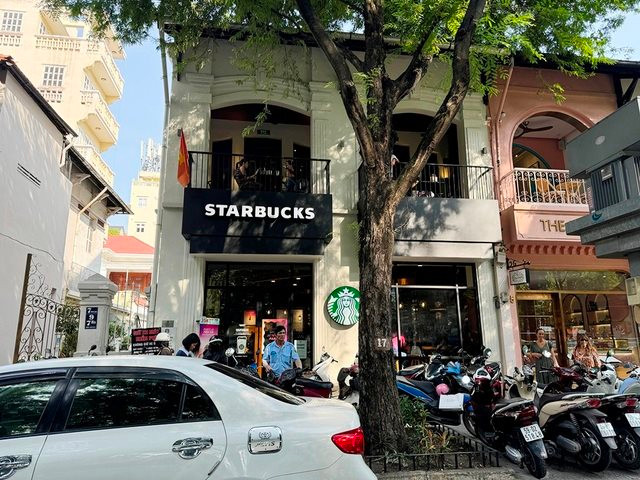According to reports, the reason for the closure of Starbucks Reserve Han Thuyen was due to a failure to reach an agreement on a lease renewal with the landlord.
Following this news, many opinions surfaced, criticizing the landlord: Why would the landlord increase the rent and risk losing a well-established brand as a tenant? The landlord must be in a strong financial position to afford leaving the property vacant for several months.
Mr. Phan Vi, a long-time broker specializing in shophouses and commercial rentals in Ho Chi Minh City, offered a different perspective. He explained that in most cases, landlords do not retake possession of the property. Instead, large chains like Starbucks deciding to vacate a premises is often due to their own business strategies or a failure to reach a lease renewal agreement with the landlord. It is unfair to accuse the landlord of being “greedy” and increasing the rent, as rent increments are typically stipulated in the contract signed by both parties.
Typically, contracts include provisions for rent increases of 5-10% every 1-2 years, with some contracts specifying a 5-year term before any increase. It is important to note that if the landlord does not increase the rent, there would be no incentive for a long-term contract of 5 or 10 years.

Mr. Vi shared that there are many prime locations in Ho Chi Minh City where commercial spaces remain vacant due to high rents. In such cases, landlords often offer rent-free periods of 6 months to a year to attract tenants, with rent increases starting from the second year to align with the tenant’s investment in the property.
However, the market for commercial rentals is diverse. When it comes to large chains like Starbucks vacating a premises, the reasons are often unrelated to rent increases or the absolute rent level. It could be due to brand repositioning or changes in their business strategy.
According to Mr. Phan Vi, many landlords are open to lease renewals, provided the rent is increased, and they often give priority to existing tenants if they agree to the new terms. It’s important to understand that landlords are not arbitrarily increasing rents; the rent increments are based on the contract, and there are often other factors at play that only the parties involved fully understand. “It’s not just about the contract,” said Mr. Phan Vi, “there are other dynamics at play in the relationship between the landlord and the brand or tenant.”
From the perspective of a landlord owning a prime commercial space in a desirable location, they can afford to be selective about their tenants. Even if a prospective tenant offers a higher rent, the landlord may not agree if they feel the tenant doesn’t align with their vision for the property.
In the case of Starbucks Reserve Han Thuyen, the rent increased from 700 million VND/month to 757 million VND/month, or nearly 9 billion VND/year. According to real estate brokers, the new tenant will be offered one month’s free rent for renovations and can take possession as early as September. The tenant will be required to pay a deposit of 3 or 6 months’ rent, depending on whether they sign a 5-year or 10-year lease.
With this rent increase, Starbucks would have had to bear an additional 600 million VND/year to continue their lease. This could be one of the reasons why they decided to vacate the premises, effective August 26, 2024, as they could not reach an agreement with the landlord.
From the landlord’s perspective, leaving the property vacant for one month means forfeiting over 700 million VND in rent. If the property remains vacant for three months, it would take three years of rent at the new rate to make up for the lost income during that period.
Some landlords are willing to keep their properties vacant rather than compromise on their tenant selection. Given the prime location of the Starbucks Reserve Han Thuyen, near the Notre-Dame Cathedral and the Independence Palace, and its proximity to the 30 April Park, the rent of 11-13 Han Thuyen is actually quite reasonable compared to similar locations.
“Compared to similar locations, this property is more attractive for larger brands rather than smaller ones,” said Mr. Phan Vi, “and I believe several prominent brands are eyeing this space now that Starbucks Reserve has vacated it.”
Over the years, the high cost of renting commercial spaces in Ho Chi Minh City’s central districts has come as a shock to many. Certain streets are renowned for their exorbitant rents, and landlords have consistently raised rents despite economic downturns and tenant turnover. There have even been instances where landlords chose to keep properties vacant for several months rather than lower the rent, only agreeing to new tenants when the offered rent exceeded the previous rate.
Proposed Planning for Adding 2 New Cities in Ho Chi Minh City
According to Architect Ngô Viết Nam Sơn, Ho Chi Minh City should consider planning two cities within the city in the south and north.
Three Economic Growth Scenarios for Ho Chi Minh City in Q1 2024
At the socio-economic meeting reviewing the results of January and setting the goals for February 2024, held this morning (1/2), the Ho Chi Minh City Institute for Research and Development has presented three economic growth scenarios for the first quarter of Ho Chi Minh City.













































